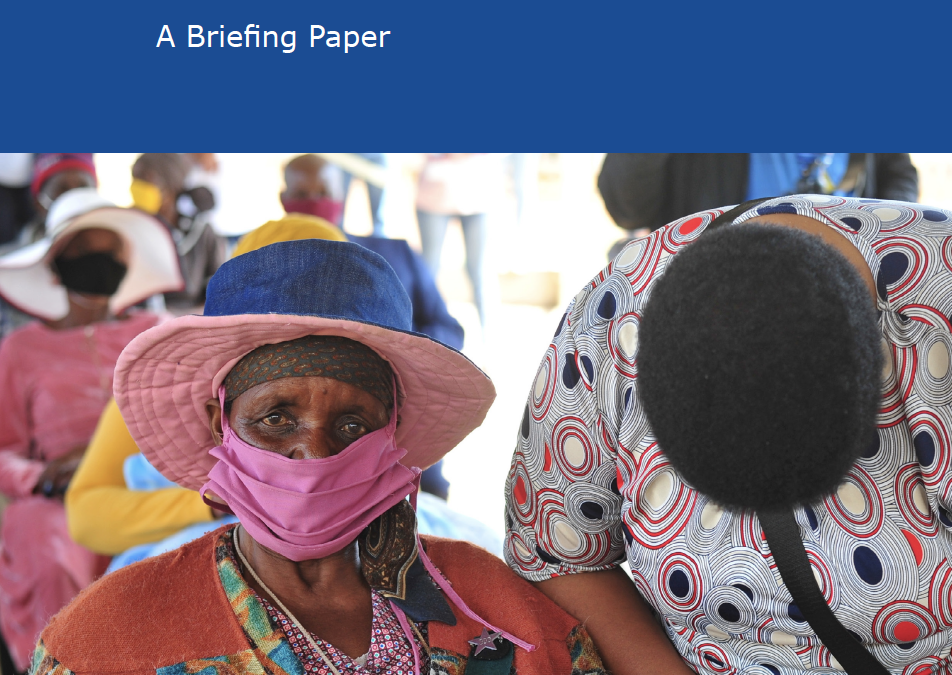


eSwatini: Police must respect people’s right to stage protests in demand of representative government
Security forces in eSwatini must respect the right to peaceful assembly and protest in anticipation of a scheduled demonstration demanding reforms to the country’s absolute monarchy, said the International Commission of Jurists (ICJ) today.

South Africa: The ICJ is concerned about unfair and non-transparent prioritization of individuals to receive Covid-19 vaccinations
The ICJ is concerned that the South African Health Products Regulatory Authority (SAHRPRA) are prioritizing young fit healthy persons to receive vaccinations. In the context of severe shortages of vaccines in South Africa and Southern Africa more generally, and in light of the stated aim of South Africa’s own vaccine roll-out plan to prioritize the most vulnerable in line with WHO advice, the vaccination of younger ‘elite athletes’ and young diplomats would appear unjustifiable on public health grounds. They are simply not priority groups for vaccination, especially where there is vaccine scarcity, inequality, and the promise by government of equality.
ICJ Africa Director, Kaajal Ramjathan-Keogh stated,
“To date South Africa has administered just over 2.23 million vaccines mostly to health care workers and persons over 60 years old. This represents just 3.76% of the population. South Africa has the highest number of confirmed cases in Africa with more than 1.86 million who have been infected and where 59 000 have lost their lives. According to the South African Medical Research Council the excess deaths, which represent a more accurate representation of Covid-19 related mortality, is at 173 000. In this context the slow pace of vaccination coupled with the unfair and unequitable prioritisation of certain groups is contributing to a devastating third wave.”
A decision taken by SAHPRA appears to contradict the eligibility criteria of the Sisonke vaccine trial (a process where a vaccine was made available to health care workers using a research programme prior to the requisite approvals and licencing processes) to include among others ‘elite athletes’, enabling them to enjoy special privileged access to some of the remaining clinical trial stock, while others at risk could have been study subjects instead.
No reasons or public health-based justifications have been made publicly available as to why athletes and other persons working in sport as well government officials were given priority access. Ramjathan-Keogh added,
“No reasons or public health-based justifications have been made publicly available as to why these athletes and as well as sports and government officials have been prioritised to receive these vaccines from the Sisonke trial. If they cannot be justified on public health grounds, we are concerned that they may be non-compliant with human rights imperatives, and we question the ethical considerations of the approach”.
According to the Africa Centre for Diseases Control and Prevention as of 24 June there are 5.2 million cases reported across Africa, with 139 000 total deaths in Africa. Most new cases are from these five countries – South Africa (35%) Ethiopia (5%), Egypt (5%), Morocco (10%) and Tunisia (7%). The highest number of new cases are emerging from Southern Africa and from these countries: South Africa, Zambia, Namibia, and Uganda representing 63% of new cases in Africa.
The ICJ calls on South Africa to follow the World Health Organization’s guidance which is to prioritise those who are more vulnerable in respect of equitable access and fair allocation of vaccines. Further, South Africa has an international legal obligation to protect the right to health as a State party to the International Covenant on Economic, Social and Cultural Rights.
The supervisory body for that treaty, the UN Committee on Economic, Social and Cultural Rights (CESCR) has affirmed that all healthcare goods, facilities, and services must be available, accessible, acceptable and of adequate quality. In addition, these goods, facilities, and services should be “accessible to all, especially the most vulnerable or marginalized sections of the population, in law and in fact, without discrimination on any of the prohibited grounds.” The right to health should be accessible without discrimination “even in times of severe resource constraints” such as those brought on by the COVID-19 pandemic.
Read the letter.
Further Reading:
ICJ, “The Unvaccinated Equality not Charity in Southern Africa” (May 2020): https://www.icj.org/wp-content/uploads/2021/05/Africa-The-Unvaccinated-Publications-Reports-2021-ENG.pdf
ICJ and Human Rights Watch, “More than words: it is time for urgent action on COVID-19 vaccines (UN Statement)” (21 June 2021): https://www.icj.org/more-than-words-it-is-time-for-urgent-action-on-covid-19-vaccines-un-statement/.
WHO, WHO SAGE values framework for the allocation and prioritization of COVID-19 vaccination (September 2020): https://apps.who.int/iris/bitstream/handle/10665/334299/WHO-2019-nCoV-SAGE_Framework-Allocation_and_prioritization-2020.1-eng.pdf
UN CESCR, Statement on universal and equitable access to vaccines for the coronavirus disease (COVID-19) (December 2020): https://tbinternet.ohchr.org/_layouts/15/treatybodyexternal/Download.aspx?symbolno=E%2fC.12%2f2020%2f2&Lang=en
UN CESCR, Statement on universal affordable vaccination against coronavirus disease (COVID-19), international cooperation and intellectual property (23 April 2020): https://tbinternet.ohchr.org/_layouts/15/treatybodyexternal/Download.aspx?symbolno=E%2fC.12%2f2021%2f1&Lang=en.
Contact
Kaajal Ramjathan-Keogh, ICJ Africa Director, Kaajal.Keogh(a)icj.org

More than words: it is time for urgent action on COVID-19 vaccines (UN Statement)
The ICJ and Human Rights Watch today addressed the UN Human Rights Council in the Interactive Dialogue on the Report of the Office of the High Commissioner for Human Rights on COVID-19 responses and human rights.
The statement reads as follows:
Madam High Commissioner,
The ICJ and Human Rights Watch welcome your report on COVID-19 and human rights.
We believe that urgent action is needed beyond broad statements of condemnation of vaccine inequity. People without access to vaccines continue to live in fear of COVID-19 and, throughout the world, many continue to die.
Slow vaccine rollout continues across Southern Africa and Latin America and in Nepal and India despite the prevalence of quickly transmitting variants. In the face of such significant peril, Indian courts have questioned the rationality of government plans. In South Africa elite athletes and sports administrators have been vaccinated, while older persons and vulnerable populations continue to wait their turn.
Pharmaceutical companies impose far reaching non-disclosure agreements on governments which restrict access to health information necessary to combat corruption and ensure accountability. In Colombia, courts have ordered disclosure of contracts relating to COVID-19 vaccines despite such agreements.
COVID-19 response measures continue to be used in Cambodia, Thailand and Vietnam to restrict access to health information and stifle expression of human rights defenders. In Hungary similar tactics have been compounded by simultaneous attacks on judicial independence.
How will the OHCHR guide States on how to ensure effective judicial and other remedies are available for those whose human rights are threatened by inadequate or inequitable COVID-19 responses?
I thank you.”

The unvaccinated: equality not charity in Southern Africa – new ICJ report
Southern African States have individually and collectively failed to provide sufficient and equitable COVID-19 vaccine access to meet their human rights obligations, the ICJ said today in a new briefing paper entitled The Unvaccinated: Equality not Charity in Southern Africa.
The paper focuses on the impact of COVID-19 on countries of the Southern African Development Community (SADC), a regional economic community comprising 16 Southern African countries whose goal is to enhance the standard and quality of life of the peoples in the region.
The publication considers SADC and its Member States’ collective failure to ensure access to COVID-19 vaccines despite more than 63,000 lives lost to the virus and countless others’ lives and livelihoods affected in the region.
This is due to a multitude of reasons, some common amongst the countries and others unique to individual Member States. While Tanzania and Madagascar denied the existence of the virus and rejected COVID-19 vaccines respectively, other countries with relatively greater resources, such as South Africa, failed to mobilize their resources adequately and equitably.
“COVID-19 is a global pandemic, but its impact was aggravated in southern Africa by the failure of governments to prepare and respond, individually or through SADC,” said Tim Fish Hodgson, ICJ’s Legal adviser on Economic, Social and Cultural Rights, in Johannesburg.
Combatting deadly communicable diseases like COVID-19 is one of the founding objectives under SADC’s founding treaty, and is also accounted for under the SADC Health Protocol. Yet, SADC has failed to provide almost any concrete guidance or coordinating role in regional procurement of COVID-19 vaccines since October 2020, prior to the availability of COVID-19 vaccines. While SADC’s chair, President Filipe Nyusi of Mozambique has encouraged a regional pooling of resources to facilitate procurement of necessary vaccines and distribution in a statement in January 2021, SADC has since taken no clear action towards this goal.
“While powerful global actors have erected roadblocks to equitable vaccine access in southern Africa, this should not conceal the burning need for SADC States to take essential measures to mobilize their collective resources towards efficient and equitable vaccine acquisition, allocation and distribution. As our research shows, they have failed to do so and SADC has been conspicuously silent,” Hodgson said.
These dire circumstances have led Fatima Hassan, South African human rights defender and director of the Health Justice Initiative, to observe that “philanthropy [and] benevolence cannot fund equality” in vaccine access. Indeed, the donation of vaccine doses through COVAX and other measures are not enough, and without rapid and adequate action to ensure equitable access to COVID-19 vaccines, it might be too late.
The ICJ’s research at a global and regional level have emphasized the urgent need for international institutions like the World Trade Organization and wealthier States to help countries to manufacture or otherwise acquire and distribute vaccines at affordable prices unimpeded by rigid intellectual property rights restrictions.
“All States should urgently heed the proposal by South Africa and India before the WTO for a waiver of the TRIPS intellectual property rules to allow faster, wider, and better distribution of COVID-19 vaccines,” Hodgson said.
“It is encouraging to see the United States end their opposition to the TRIPS waiver, and we hope that other States, in the European Union, Switzerland, Norway, and Brazil, will end their opposition and recognize that until everyone is safe, no one is truly safe.”
The ICJ emphasized that efforts by SADC and Southern African States is essential alongside ramped up global action.
“The pandemic is raging around the world even though a few countries, mostly the wealthiest, are now able to look beyond the worst of it. Most countries in Southern Africa remain unvaccinated, and in fact we are looking at new devastating waves of the illness. SADC should immediately improve efforts at collaboration and coordination to ensure compliance with their human rights obligation to provide everyone in the region with vaccine access as soon as possible,” Hodgson added.
The ICJ makes recommendations to specific States including Malawi, Tanzania, Madagascar, Zimbabwe and South Africa as well as a range of general recommendations to the SADC, including:
- The SADC Secretariat should urgently and actively facilitate and advance sub-regional COVID-19 vaccine procurement and distribution between the Member States.
- The SADC Secretariat should provide clear guidance to Member States on their human rights obligations pertaining to vaccine access. They should take effective action to address the failure of Member States to act according to their obligations under international law, including under regional agreements.
- All SADC member States should, as a matter of priority, develop, publish and publicize national vaccine acquisition and rollout plans and procurement strategies, detailing concrete measures to ensure non-discriminatory access to vaccines to all people.
Contact
Timothy Fish Hodgson, Legal Adviser on Economic, Social and Cultural Rights, timothy.hodgson(a)icj.org
Tanveer Jeewa, Legal and Communications Officer, tanveer.jeewa(a)icj.org
Download
Africa-The Unvaccinated-Publications-Reports-2021-ENG (full report, in PDF)




